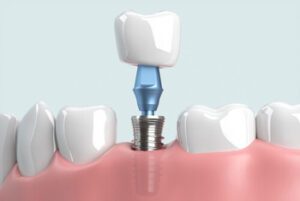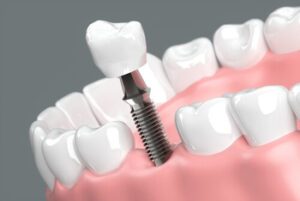Understanding Dental Implants

Getting dental implants begins with a comprehensive dentist evaluation. It may involve X-rays and dental scans to assess the health of your jawbone and oral tissues. If you’re deemed a suitable candidate, the implant surgery involves placing the implant into the jawbone, followed by a healing period, often several months, to allow for osseointegration (the fusion of the implant with the bone). The final step involves placing a crown or a bridge onto the implant, restoring the appearance and function of natural teeth.
Choosing dental implants over other dental procedures like bridges or dentures has several benefits. Implants provide a more natural look and feel, better chewing efficiency, and do not require alteration to the adjacent teeth, preserving more of your natural tooth structure. Additionally, they can help prevent bone loss in the jaw, a common issue with missing teeth. While dental implants cost more than other treatments, many dental insurance plans and health insurance policies now offer coverage for major dental procedures like implants, making them more accessible. Dental implants represent a significant advancement in dental treatments, combining improved oral health with the convenience and aesthetics that modern dentistry strives for.
The Cost of Dental Implants
Dental implants have become a popular solution for missing teeth, offering a more permanent and natural-looking alternative to dentures or bridges. However, the cost of dental implants can be a significant factor for many individuals considering this option. On average, the dental implant cost ranges widely, primarily influenced by factors such as the complexity of the procedure, the materials used, the experience of the dental professional, and geographical location.
When considering dental implants, exploring dental insurance coverage options is crucial. Many health insurance policies, including private health insurance and major dental cover, may partially cover dental implants. However, it’s important to understand that not all insurance providers include implant surgery in their dental coverage, and there might be waiting periods before you can claim benefits for major dental procedures. For instance, dental health maintenance organisations and dental indemnity plans have different stipulations regarding coverage for such procedures.
Dental implants can be more costly upfront but offer longer-term benefits than other dental treatments. Unlike tooth extractions or bridges, implants provide a more durable and functional solution. It’s essential to discuss with your primary care dentist or dental clinic the full scope of the implant procedure, including potential out-of-pocket costs and how insurance coverage works. Some health funds and dental insurance plans may offer different levels of coverage for dental implant surgery, so thorough research and consultation with your insurance company are advised.
Overall, while the initial dental implant costs might seem high, the long-term benefits of oral health maintenance and the natural feel of implants often outweigh the expense, especially compared to the cumulative costs and maintenance of other dental procedures.
What is Dental Insurance?
Dental insurance is a type of health insurance designed to cover some dental care costs. From routine check-ups to complex procedures, dental insurance can help mitigate the financial impact of dental treatments. The primary purpose of this insurance is to make dental care more affordable and accessible, promoting regular dental visits and overall oral health maintenance.

Dental Insurance and Implants Coverage
Dental insurance that covers implants can significantly reduce the financial burden of this major dental procedure. While not all dental insurance plans include coverage for dental implants, there is an increasing trend among providers to offer some level of coverage for these procedures. Insurance coverage for dental implants may vary in percentages, caps, and limitations.
The specifics of coverage often depend on your dental plan type. Some insurance plans may cover a portion of the cost of the dental implant procedure, which includes the surgery and the placement of the artificial tooth. However, there are usually caps or limits on how much the insurance will pay in a year, and dental implants can often exceed these limits due to their higher cost than other dental treatments.
To determine if your dental insurance covers implants, reviewing your policy details or contacting your insurance provider directly is crucial. Look for specifics under major dental cover or major dental procedures, and pay attention to any waiting periods that might apply. It’s also advisable to discuss this with your dentist, as they can provide insights based on their experience with similar cases and different health insurance policies. By understanding the extent and limitations of your coverage, you can better plan for any out-of-pocket costs incurred during your dental implant treatment.
Choosing the Right Dental Insurance for Implants
Selecting the appropriate dental insurance for implants requires careful consideration. Key factors include understanding the coverage extent for major dental procedures, especially dental implant treatment, and the dental implant cost covered by the policy. It’s important to compare different health insurance providers, particularly focusing on those that cover dental implants. Not all insurance plans include dental implant surgery, and there might be variations in coverage for dental implant procedures among different health insurance companies.

Reading and understanding the details of dental insurance policies is crucial. Confirm with the insurance provider the extent of coverage for dental implant costs and any exclusions or limitations. Also, consider the network of dental clinics and whether your primary care dentist is included. Understanding these aspects will help ensure that you choose a dental insurance plan that adequately meets your needs for dental implant treatments.
Conclusion
Navigating the intricacies of dental insurance for implants is vital for anyone considering this significant dental treatment. Understanding the coverage for dental implants, including the specifics of percentages, caps, and limitations, is crucial. Dental implants represent a major advancement in oral health care, offering a long-term solution for missing teeth. However, their cost can be considerable, making the role of dental insurance pivotal. We encourage you to conduct thorough research and consult with your insurance provider to understand your coverage fully. Adequate insurance coverage is essential for ensuring the affordability and accessibility of these important dental treatments. For expert advice and dental services, including dental implant procedures, visit Balmoral Dental Centre or call us at (07) 3113 9789. Let us help you achieve the smile you deserve with the right dental care and insurance coverage.
References:
https://www.webmd.com/health-insurance/dental-insurance-overview
https://www.healthline.com/health/dental-and-oral-health/dental-implant-procedure
https://www.verywellhealth.com/best-dental-insurance-for-implants-5191285

